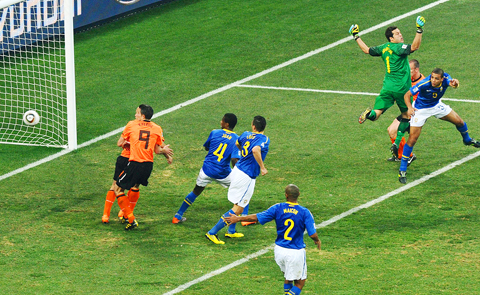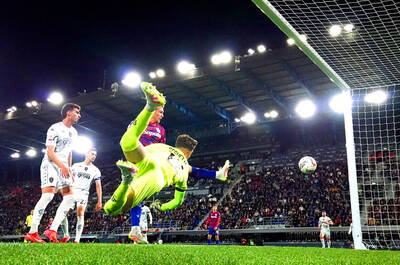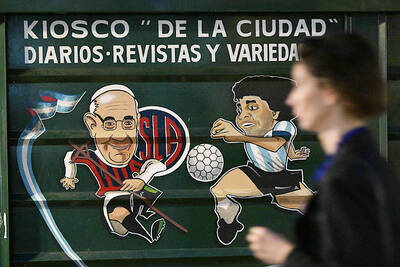The World Cup was treated to its final, just two games too early. For drama and intensity, the spectacle of the Netherlands stunning and bullying Brazil will be hard to outdo at this tournament.
The five-time champions are such soccer giants that there is always an earthquake-like thump when they are brought to their knees. Yet, this time, their 2-1 loss didn’t feel like a massive shock.
Kaka and his amigos mistakenly thought they could lift the heavy gold statue without showing up in South Africa with the beautiful game that made Pele and his teammates world-famous.

PHOTO: AFP
Coach Dunga gambled that merely winning would be enough to assuage the critics on the beaches and farms, in the cities and shantytowns back home who worried that Brazil’s traditions of entertaining, dancing soccer were being betrayed.
Dunga was right. Had Brazil won, the manner of it wouldn’t have mattered, but losing wasn’t part of the deal. In the end, the manner of Brazil’s play was far more important than Dunga made out. In kidding themselves that efficient, often unglamorous, percentage soccer would take them to the July 11 showpiece match, the Brazilians forgot to light up and really spark in South Africa. They were definitely good, but not Brazilian brilliant, and that was their undoing. They let Argentina claim the crown as kings of attacking, inventive soccer. As a result, Diego Maradona is looking like an increasingly good bet to win the World Cup both as a player and coach.
Dunga blamed a poor second-half against the Dutch, but that was only half the story.
In five World Cup games, Brazilian beauty came only in flashes and it wasn’t enough. Maicon’s oooh-aaah! strike in the first match against the North Koreans, squeezed between the keeper and his post from the tightest of angles, was, in fact, a mirage, because it misleadingly suggested that Brazil would be both flashy and victorious. With hindsight, the 55 minutes it took Brazil to break open the Korean defense should have set alarm bells ringing.
Luis Fabiano’s illegally handled second goal took some of the shine off Brazil’s 3-1 defeat of Ivory Coast. A goalless draw with Portugal was not only boring, but again showed that Brazil couldn’t call up goals at will. Only half an hour into the round of 16 elimination game against Chile did Brazil finally turn it on.
Never mind, we told ourselves, this is Brazil. They’ll find a higher gear when they need it.
Well, they needed it against the Netherlands, but instead, they lost their heads. Turns out that Brazilians get hot, bothered and lose their focus when niggled by the likes of Mark van Bommel, who was a real bully in the Dutch midfield, and Arjen Robben, who did not score, but made a real pest of himself with his light-footed runs.
A turning point was Felipe Melo’s stupid hot-headed stamp on Robben’s thigh. It got him sent off with 20 minutes left, scuttling Brazil’s chances of recovering from its 2-1 goal deficit.
Also vital was Maarten Stekelenburg’s astounding save of Kaka’s shot on 31 minutes. Had it gone in, it would have been curtains for the Netherlands, giving Brazil a 2-0 lead.
The lead-up — Robinho wriggling past two defenders, passing to Luis Fabiano, his subsequent backheel to Kaka — was the most delightful piece of Brazilian play at this World Cup. Had Brazil done that more often, Brazil would still be here, not making excuses.
“I just called home and my son was crying,” Felipe Melo said after the match. “I have to apologize.”
However, the fault was collective not individual, and it didn’t help Brazil that Kaka was not at his best in South Africa. Like other stars of world soccer — think Ronaldo, Wayne Rooney or Samuel Eto’o — he failed to live up to his billing.
Like his team.

Bologna on Thursday advanced past Empoli to reach their first Coppa Italia final in more than half a century. Thijs Dallinga’s 87th-minute header earned Bologna a 2-1 win and his side advanced 5-1 on aggregate. Giovanni Fabbian opened the scoring for Bologna with a header seven minutes in. Then Viktor Kovalenko equalized for Empoli in the 30th minute by turning in a rebound to finish off a counterattack. Bologna won the first leg 3-0. In the May 14 final in Rome, Bologna are to face AC Milan, who eliminated city rivals Inter 4-1 on aggregate following a 3-0 win on Wednesday. Bologna last reached the

If the Wild finally break through and win their first playoff series in a decade, Minnesota’s top line likely will be the reason. They were all over the Golden Knights through the first two games of their NHL Western Conference quarter-finals series, which was 1-1 going back to Minnesota for Game 3 today. The Wild tied the series with a 5-2 win on Tuesday. Matt Boldy had three goals and an assist in the first two games, while Kirill Kaprizov produced two goals and three assists. Joel Eriksson Ek, who centers the line, has yet to get on the scoresheet. “I think the biggest

From a commemorative jersey to a stadium in his name, Argentine soccer organizers are planning a slew of tributes to their late “Captain” Pope Francis, eulogized as the ultimate team player. Tributes to the Argentine pontiff, a lifelong lover of the game, who died on Monday at the age of 88, have been peppered with soccer metaphors in his homeland. “Francisco. What a player,” the Argentine Football Federation (AFA) said, describing the first pope from Latin America and the southern hemisphere as a generational talent who “never hogged the ball” and who showed the world “the importance of having an Argentine captain,

Noelvi Marte on Sunday had seven RBIs and hit his first career grand slam with a drive off infielder Jorge Mateo, while Austin Wynn had a career-high six RBIs as the Cincinnati Reds scored their most runs in 26 years in a 24-2 rout of the Baltimore Orioles. Marte finished with five hits, including his eighth-inning homer off Mateo. Wynn hit a three-run homer in the ninth off catcher Gary Sanchez. Cincinnati scored its most runs since a 24-12 win against the Colorado Rockies on May 19, 1999, and finished with 25 hits. Baltimore allowed its most runs since a 30-3 loss to